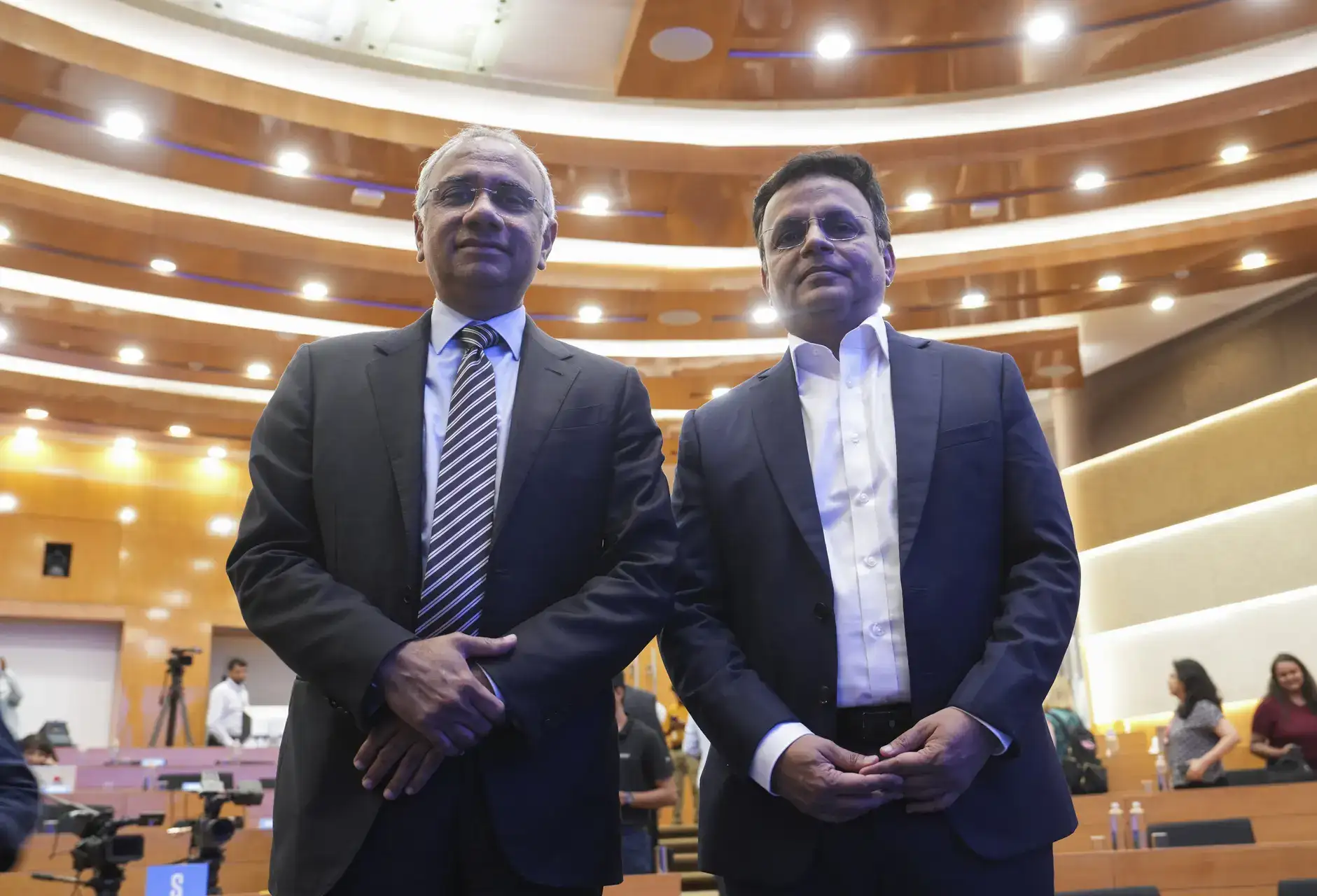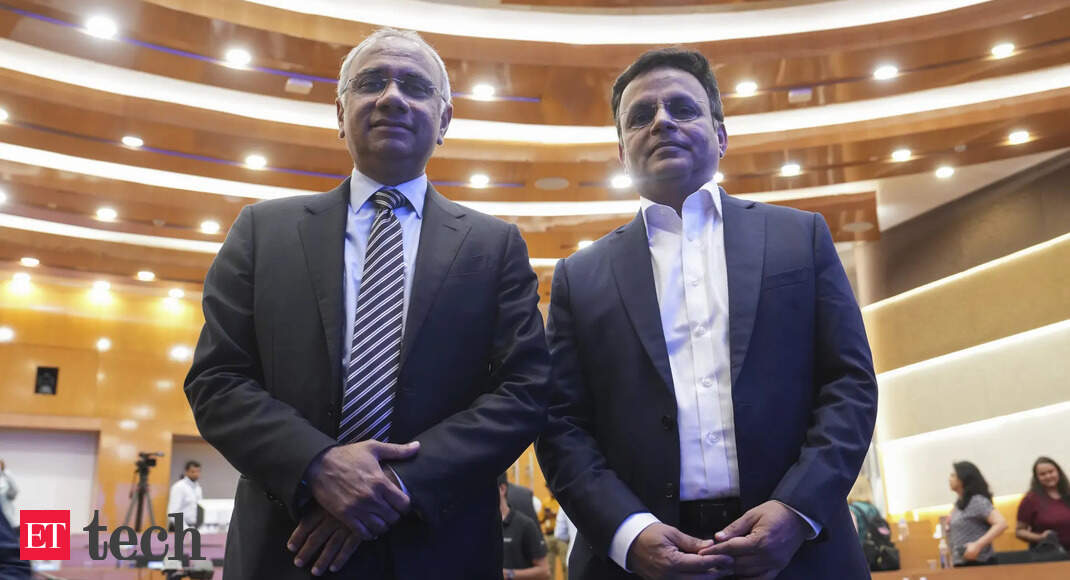Also in the letter:
■ End of road for Good Glamm
■ TCS hiring troubles
■ Hackers at US nuclear agency’s door
Infosys posts steady Q1, ups lower-end revenue guidance

Infosys CEO Salil Parekh with CFO Jayesh Sanghrajka
Infosys kicked off FY26 on solid footing. India’s second-largest IT services exporter delivered results in line with expectations, posted healthy deal wins, maintained strong cash flow, and nudged up its revenue outlook.
Number-wise:
- Net profit: rose 9% year-on-year (YoY) to Rs 6,921 crore
- Operating revenue: climbed 8% YoY to Rs 42,279 crore
- Revenue growth (in constant currency): grew 3.8% YoY and 2.6% sequentially
Why it matters: Despite macro uncertainty and sluggish global tech spending, Infosys stayed on course. The company raised the lower end of its FY26 revenue growth forecast to 1–3% in constant currency, signalling cautious optimism.
Zoom in:
- EBIT margin was 20.8%, down 30 basis points YoY.
- Large deal wins touched $3.8 billion, with 55% from net new clients.
- Segment-wise growth was led by manufacturing (12.2%) and financial services (5.6%), while life sciences and ‘others’ saw decline.
- Attrition inched up to 14.4%, with a modest net headcount addition of just 210.
Between the lines: CEO Salil Parekh pointed to rising momentum in AI-led deals and client consolidation. The company’s Project Maximus continues to improve internal efficiencies. Cash flow remained robust at $884 million, with conversion topping 100%.
ED files Fema case against Myntra over FDI violations

The Enforcement Directorate has filed a case against Myntra Designs Pvt. Ltd. and its affiliates for allegedly violating the Foreign Exchange Management Act (Fema), 1999, involving a sum of Rs 1,654.35 crore.
Why it matters: This move indicates increased regulatory scrutiny on ecommerce firms, particularly concerning how they balance the fine line between wholesale and multi-brand retail — an area governed by more stringent foreign direct investment (FDI) rules.
The charge: According to the ED, Myntra exploited the ‘wholesale cash and route’ to partake in multi-brand retail trade (MBRT). Most sales were allegedly routed through Vector E-Commerce, a group entity, breaching the 25% cap on intra-group transactions under FDI regulations.
Violation details: The case cites violations of Section 6(3)(b) of Fema and the 2010 Consolidated FDI Policy amendments. Myntra, owned by Flipkart, said it has not yet received the complaint but promised full cooperation.
Company’s statement: “While we have not received a copy of the subject complaint and the supporting documents from the authorities, we remain fully committed to cooperating with them at any point of time.”
Catch up quick: The ED action comes amid growing scrutiny of ecommerce structures, with Flipkart and Amazon also facing questions over vendor control and group-linked operations.
Good Glamm Group to be broken up; all brands up for sale

Good Glamm CEO Darpan Sanghvi
The Good Glamm Group is being dismantled. Its lenders have enforced claims on individual assets, leading to a sale of brands one by one. The company will no longer operate as a single collection of brands, confirmed founder and CEO Darpan Sanghvi in a LinkedIn post.
Driving the news: Sanghvi wrote, “Our lenders have decided to enforce their charge on the individual brands under the Good Glamm Group. What this means is that there will no longer be a group-wide solution which will allow all the brands to continue under a single umbrella. Instead, the brands will be sold one by one.”
Backstory: Launched as MyGlamm in 2017, the firm rebranded in 2021 and went on an aggressive buying spree—picking up POPxo, BabyChakra, Sirona, and ScoopWhoop. Fuelled by the funding frenzy, it paid steep prices for businesses that failed to scale.

Recent cracks:
The bottom line: Touted as India’s Thrasio, Good Glamm’s collapse exposes the perils of debt-driven rollups without sustainable growth.
Also Read: House of cards: Roll-up ecommerce model stumbles as founders reclaim brands amid funding struggles
TCS in the dock as lateral hires allege onboarding delays

IT giant Tata Consultancy Services (TCS) is under fire after an IT employee union alleged the company delayed onboarding nearly 600 lateral hires. Many had quit existing roles based on official joining letters, only to be left without revised timelines or compensation.
Why it matters: The complaint adds to the growing HR turbulence in India’s IT sector. With muted client demand and tighter staffing strategies, firms like TCS are under pressure. The company is also drawing criticism for a new bench policy that caps idle time at just 35 days a year.
The complaint: The Nascent Information Technology Employees Senate (NITES) has written to Labour Minister Mansukh Mandaviya, urging him to intervene. It has demanded fixing onboarding timelines, financial support for affected candidates, and access to TCS’s mental health support programs.
Candidate fallout: Professionals in cities such as Bengaluru, Hyderabad, Pune, and Delhi have reported emotional and financial distress, with many struggling to meet EMIs and rent obligations.
TCS responds: The company stated it will honour all job offers and determine start dates based on business demand. It added that communication with candidates is ongoing.
Also Read: TCS rolls out 100% Q1 variable pay for 70%+ employees
Hackers breach US nuclear agency via Microsoft SharePoint flaw

Chinese state-backed hackers have allegedly exploited a significant vulnerability in Microsoft’s SharePoint to breach several US government agencies, including the National Nuclear Security Administration (NNSA), according to a Bloomberg report.
Why it matters: First flagged at a security contest in May, the flaw has since fuelled a sweeping cyber-espionage campaign of global proportions. Hackers, the report added, have infiltrated over 100 servers across the US, Europe, and the Middle East.
The details:
- Microsoft acknowledged the flaw, but its initial fix did not stop the breaches.
- Hacking groups codenamed “Linen Typhoon” and “Violet Typhoon” are among those involved.
- Victims include the US Department of Education, the Rhode Island General Assembly, and a Southeast Asian university.
What they stole: Credentials, tokens, and backdoor entry points, some of which remain even after patches have been applied.
China’s reaction: The Chinese Embassy denied any involvement, dismissing the accusations as baseless and unproven.
Expert view: Researchers say SharePoint’s deep integration with Microsoft services makes this flaw especially dangerous. Some breached servers belong to multinationals and government entities worldwide.
Also Read: What to know about a vulnerability being exploited on Microsoft SharePoint servers


